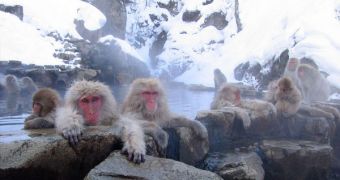Scientists were recently puzzled to find out that monkeys too had the ability to care for their grandchildren. The investigation, which was conducted on a group of Japanese macaques, proved that, when needed, grandmothers took their nephews in, and cared for them as their mothers would have. This is the first instance when such a behavior is demonstrated outside our own species, the research group says. The test subjects were living freely in the wild, in the Katsuyama region of Japan.
“We know that some monkeys sometimes adopt infants. In most cases, it is females who have lost their own infants. However, in the present cases, the old, probably post-reproductive mothers started to take care of their young granddaughters. It is very unusual for females who have not had their own young offspring for years to start to take care of other infants,” Osaka University scientist Dr. Masayuki Nakamichi, who has been studying the creatures for more than 30 years, explains. Complete details of the investigation appear in the latest issue of the scientific journal Primates, the BBC News reports.
Discovering the kinship relations between the adopted monkeys and the grown-up females may have been difficult in a normal setup, but this particular group of macaques has been continuously studied since 1958. This allowed the investigators to keep an accurate account of which animal was related to what other member of the group. In a particular instance, a macaque grandmother was found to be taking care of her granddaughter, after the cub's mother had disappeared unexpectedly from the troupe.
The mother went missing for six full days, during which time the grandmother took care of the little one permanently. Once the wandering mother returned, she gradually assumed her role as the “legal guardian” again. The OU group believes that the new observations may in fact help test an idea known as the “grandmother hypothesis.” Dr Nakamichi explains that, “It is an idea that post-reproductive grandmothers can play an important role in the survival of their grandchildren, although they cannot produce their own offspring.”
“To our knowledge, there have been no reported cases in which, instead of a mother, a grandmother without dependent offspring has continuously provided essential care for the survival of her dependent grandchild, which is in accordance with the grandmother hypothesis,” the authors conclude in the journal entry.

 14 DAY TRIAL //
14 DAY TRIAL //